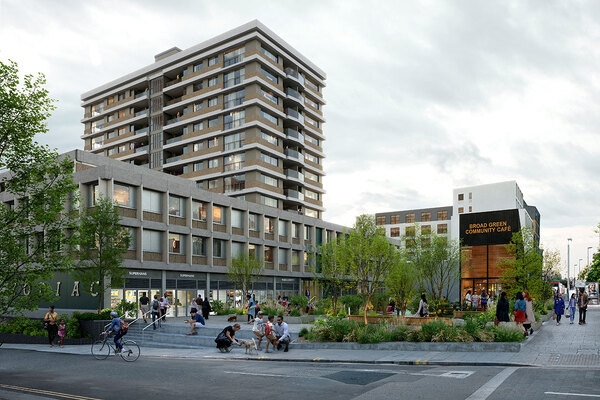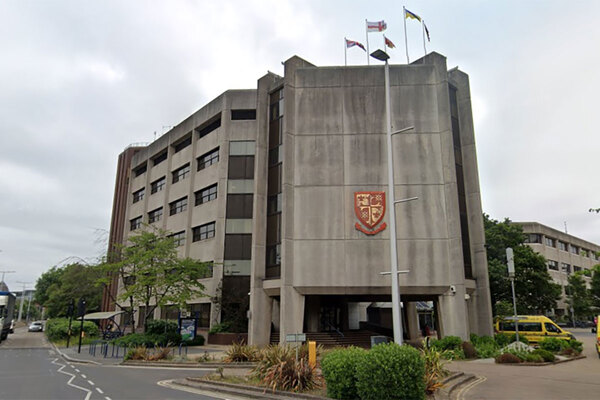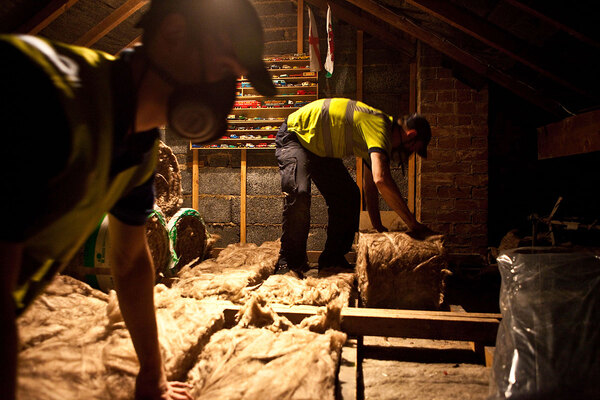The TikTok entrepreneur making a profit from ‘social housing’
On TikTok, Jack Wicks has been advertising high-return investments in his company Social Housing Group. James Riding reports
“We’ve created a step-by-step way of making 10 grand a month within 12 months,” says entrepreneur Jack Wicks in one of his TikTok videos.
Like many business influencers, 34-year-old Mr Wicks uses social media to show off his Porsche and his ski holidays, and encourage his 29,000 followers to invest in his company. A typical investor, he claims, will put in £16,000 and, after a three-month delay, receive £625 a month for the next 36 months: a total return of around 50%.
He is not trading cryptocurrencies or foreign exchange, or running a private buy-to-let empire. Mr Wicks is the director of a company called Social Housing Group (SHG). He explains his mission in a video on Instagram: to house one million vulnerable people. “My kids are gonna go, ‘My dad did this,’” he says.
Intrigued by the promise of such high returns, Inside Housing set out to investigate Social Housing Group six months ago. Then this month, in an unconnected development, City of London Police revealed on its online portal that it was investigating two companies offering “investment opportunities within the social housing sector”. One is Social Housing Group.
Four directors (across both firms) have been arrested “on suspicion of fraud and money-laundering offences”, but their names have not been released, and as of 6 February, no charges have been made. Mr Wicks and business partner Kevin Brittain deny any misconduct, and say Social Housing Group will be proved innocent when they say the investigation is due to close at the end of February.
The two directors of SHG said in an email to Inside Housing: “We are extremely upset to be involved in this investigation and are working tirelessly to be removed from it. Our only connection to the other company in question was as an investor, and we have suffered significant financial losses as a result. Despite these challenges, our commitment to our investors remains unwavering, and we hope to find a solution once we can resume normal operations. We have worked incredibly hard to build this business, and it is deeply upsetting to see its name associated with negativity in this way.”
As their story takes a dramatic turn, Inside Housing publishes the results of our own investigation into Social Housing Group – a new kind of housing company which aims to help people “who actually need it”, as Mr Wicks says he is doing, and promises investors high returns. Inside Housing’s investigation is entirely independent and no suggestion is made that the findings of this investigation support allegations of illegality or are related to the investigation being conducted by City of London Police.
Homelessness accommodation in Birmingham
Digbeth is a 15-minute walk from Birmingham city centre, but it feels like another world. Huge brick offices and warehouses sit boarded up and vacant, occasionally used for pop-up bars aiming for some Shoreditch-style shabby chic.
At one corner of graffiti-strewn Rea Street is St Eugene’s Court, a 46-bedroom supported living scheme run by housing association Midland Heart. It offers residents tenancy-ready workshops and advice on budgeting and healthcare. Meanwhile, just next door, a run-down property of a similar size is being converted by Social Housing Group into homelessness accommodation.
“We’ve just taken on this entire block,” says Mr Wicks in a video from August 2023. “It’s a 44-bedroom block of studio apartments, and we have taken them on to rent them out as emergency housing.” He explains who might live there: “Someone might have had a fire in their family home, it might be an asylum seeker awaiting somewhere to go longer-term.”
Almost a year later, when Inside Housing visits, the property is padlocked. Refurbishment has begun but it looks unfinished: boxes of plumbing equipment can be seen through the newly installed glass door, which is still covered with protective plastic.
Mr Wicks’ building and St Eugene’s Court are mere metres apart, but there are big differences in the models that underpin these schemes.
One is run by a non-profit housing association; the other is marketed on high returns.
One provider is registered with the Regulator of Social Housing, one is not.
One provider depends on government grant and institutional capital; the other relies on retail investors sourced over social media by a network of influencers.
To find out more about how Social Housing Group works, I register for one of Mr Wicks’ free webinars where he seeks to recruit potential “partners” into the business. He says his company has properties all over England, from Hastings to Milton Keynes, and claims it raised almost £4m in the first four months of 2024, including £2m in March alone.
According to its most recent published accounts on Companies House, as of March 2023, the company had £2.2m of assets (its accounts for 2023-24 are overdue).
Streaming live on YouTube, Mr Wicks tells viewers his life story. He worked in pubs and bars from the age of 16, before becoming a “social housing investor”. For the past three years, he has been using the ‘rent-to-rent’ model. This means his company leases empty commercial spaces or run-down houses in multiple occupation (HMOs), refurbishes them, and then rents them out to large corporates to use as asylum seeker accommodation or supported housing.
In this line of business, he explains on a livestream, the main clients are not housing associations but rather three “government-backed contractors”: Serco, Mears Group and Clearsprings Ready Homes. These companies operate short-term emergency housing for asylum seekers and victims of domestic violence with an element of support. Such housing is exempt from capped Local Housing Allowance (LHA) rates, so Mr Wicks can charge higher rents. He mentions that he also does direct deals with housing associations, but these long-term contracts do not pay as well: usually just 10-20% on top of LHA.
Inside Housing approached the three contractors for comment. A Serco spokesperson said: “Serco can confirm that Social Housing Group provides Serco with a small number of houses to accommodate asylum seekers.” It said it had nothing to add since the arrests.
Mears Group said: “We are not aware of any lease agreements between Mears and the companies or people you have inquired about. Mears leases properties from a network of landlords and investors across the UK to meet a variety of accommodation needs. A robust due diligence process is carried out to ensure properties meet at least minimum contractual standards and a benchmarking exercise against LHA rates ensures value for money for our clients.”
“It’s a 44-bedroom block of studio apartments, and we have taken them on to rent them out as emergency housing”
When I speak to Mr Wicks one-on-one later, I tell him Mears was not aware of any deals it had made with SHG. He says that these contracts are done through an agent. “We have direct contracts, but we also use other agents who will come to us with these contracts, and some of them will even come to us with an entire package deal,” he says.
“They’ll say to us, ‘Here’s this block of apartments, we’ve secured it with the landlord, we’ve also got the council or the contract here, this is what the returns are.’ We’ll take on that whole block ourselves, cut that up into pieces and sell the individual units to investors.” SHG’s work with housing associations is also predominantly through agents, he adds.
Clearsprings Ready Homes said: “We are aware of the ongoing police investigation and are working with the City of London Police to ensure all necessary information is provided. We would like to clarify that our organisation is not involved in any capacity and we take these allegations very seriously. We are dedicated to maintaining the highest standards of integrity and ethical conduct throughout our supply chain.
“We want to reassure our stakeholders that we are taking all necessary steps to understand this situation and to respond to information provided to us. We will uphold our commitment to ensure responsible business practices are maintained by all of our subcontractors, landlords and agents. We are committed to learning from this experience and implementing any necessary changes to improve our operations and governance.”
The money to refurbish Mr Wicks’ properties comes from investors, who are sourced by the company’s ‘partners’, or sales reps. On the livestream, he invites viewers to sign up for his training course to become partners and market investment opportunities on their own social media for a cut of each deal. Mr Wicks’ training course costs £899, although he promises he will work with you until you earn double that in commission. In the live chat, up pops a post from someone who says they are currently on the course: “My only regret is that I didn’t join earlier!!”
Interview with Inside Housing
In late August, I contacted Mr Wicks for a one-on-one interview. He was enthusiastic about his business model as he spoke to me over Teams from Spain where he had been on holiday.
“Social housing should be the new Airbnb of property,” he says. “This should be the cool, new strategy that young kids want to get into… That’s what I’m really trying to push forward. And it is difficult, because social housing has probably some of the most boring people that exist in this sector, I think, and they do nothing to help people want to get involved in it.”
He tells me how he began investing in property, through HMOs in Surrey, then sourcing deals for house-to-HMO conversions, before he discovered “the asylum seeker stuff, and the social housing, and the guaranteed element of it”.
“I was at this point nine years into property, and I was like, ‘I never want to have to manage a tenant again,’” he says. By simply doing the contracts, getting houses fixed up and signed off by Serco, who then went directly to the landlord, he didn’t have to deal with tenants at all. “We really started looking into it on a practical point of view, rather than a purposeful point of view. Very quickly, it morphed into the purpose.” To formalise his newfound motivation, he renamed the company – from Property Empire Holdings to Social Housing Group.
After six months of working with Serco, he says: “We housed about 200 people. I remember being in London and just thinking, 200 people who have jumped on a boat with their family to travel through the night across the borders – and I don’t care what anybody says, nobody does that unless they’re desperate – I was like, we’ve given those people a second chance.”
Now, the question I am keenest to ask: how is he able to promise such high returns? I put his “£16,000 in, £625 a month out for 36 months” figure to him. He says it would apply to emergency housing, rather than LHA rates. “That’s capital and interest,” he adds. “It is still a great return.”
SHG doesn’t need to make huge margins, he says, because “we don’t have a huge sales team, we don’t have an office… We have all of our staff overseas at anywhere from $3 to $5 an hour”. The business, he says, has around 25 staff members in the Philippines, an editor in Pakistan and only two UK-based employees: Mr Wicks and his business partner Mr Brittain. Mr Brittain was approached for comment but has provided nothing further than his response to the police investigation.
SHG must offer high returns, Mr Wicks says, because “rent-to-rent is a really weird thing unless you’re in the industry, it’s really difficult to explain [and] in a traditional sense, it is risky. Therefore we have to pay a higher rate”.
“Social housing should be the new Airbnb of property. This should be the cool, new strategy that young kids want to get into”
He continues: “We’ve worked really hard to try and give security to investors as much as we plausibly can, but they’re not going to get a traditional security because we don’t own the property.”
“We make good money in our business,” he goes on. “I don’t think charity works, in my opinion, because you have to raise finance, continually, all the time… Our aim is to be self-sufficient.”
What does he say to those who are nervous about profiting from a space traditionally dominated by charities?
“At the top of the biggest charities in the world are people getting paid serious money, and if they are good at what they do, so they should… People really hate the idea of charity and money being made, but in my view, it’s completely essential.”
I ask Mr Wicks for a breakdown of SHG’s properties by type. He says he doesn’t have the exact figures to hand – “I’m the marketing and sales side of things” – but says the group struck over 900 unit-sized deals in 2024 with investors, and the typical amount put in by an individual investor “flips between £15,000-£18,000”.
Asylum seeker accommodation
Clearsprings is his main client for long-term asylum seeker accommodation (meaning it is let at Local Housing Allowance rates over five to seven years). “We’ve done a lot with Clearsprings,” he says. “We did loads in Reading, we’ve done a few in Southampton, we did tons in Portsmouth.” SHG took on a property for 16 to 18-year-old care leavers in 2023 and Mr Wicks says housing these people is “something we’re really interested in doing more of”.
The company is also starting a matchmaking service for landlords, which generates higher margins. SHG connects a landlord with a provider and takes a 10% maintenance fee for the life of the contract, he says. “We’re using our experience now to say to a landlord, ‘We work with all these companies, we can get you a good rate and demystify everything to do with these contracts.’”
How does he ensure the quality of his accommodation is sufficient? “The temporary stuff is all pretty much really nice new stuff,” he says. “The longer-term stuff, LHA rate level… is a lot more difficult, because you are trying to make good from years and years of typically student tenant abuse of a property, and quite frankly shitty landlords.”
Fixing these run-down homes can cost up to £10,000, he says. Typically, brand new furniture goes in across the board. “Then all fire regs, and little things like window restrictors on the higher parts of the building.”
Social housing isn’t a trademarked term, but it does not seem that Mr Wicks’ business fits the legal definition of social housing – which, crucially, is let at sub-market rates. As housing professionals will tell you, the returns from social rented homes are not high – certainly not as high as those Mr Wicks claims to be offering. For example, Elite Realty Invest, another investment company, promises 10% net returns or £18,200 per year for an £182,000 investment in a social housing scheme. Most temporary accommodation, by contrast, is not social housing because the rent levels are too high. A ‘rent-to-rent’ model, which involves several parties taking a cut along the way, is particularly likely to result in high rents.
I put it to him that what SHG is doing is not officially social housing. “Let’s not worry about these little things,” he says. “Let’s worry about getting together and housing people. Like, it’s not that important, the terminology we use. Let’s just fucking house people.”
From Mr Wicks’ standpoint, he has simply identified a gap in the market – the desperate shortage of temporary accommodation – and is capitalising on it to provide an in-demand service. In fact, he argues that he is saving taxpayers money. “The alternative is that they’re in hotels, which cost around £66 per person per night,” he says on the webinar. “We are around a third of the cost of that hotel to the taxpayer.”
Councils are looking at all sorts of routes to meet their temporary accommodation needs, and those that do not have properties of their own need other people to provide them. Some registered providers have contracts with local authorities to provide temporary accommodation. There are plenty of other property management companies which lease homes to local authorities and encourage private investors to put in their money for “stress-free property ownership with guaranteed returns”.
Evidently, Mr Wicks is not the first person to have identified temporary housing as a business opportunity.
“Property is full of money-driven bellends,” says Mr Wicks in a 2023 podcast appearance. “They all think they’re doing something different, changing the game.”
He implies that his company is different: “Nobody loses in this circle that we’ve built.”
Recent longform articles by James Riding
Dagenham fire: what happened and what we know about the building
A fire at a block of flats in Dagenham, east London, on Monday has sparked fresh debate about the slow progress of cladding remediation in the UK. James Riding runs through what we know so far
Peter Denton discusses the Homes England review and Section 106 jitters
Homes England’s chief executive tells James Riding that a new government review is a “call to arms” for the agency to take a more hands-on role in development
The man who runs Homes England’s Affordable Homes Programme
Shahi Islam speaks to James Riding about his new role as director of Homes England’s Affordable Homes Programme and his desire to be “more front-facing” in the sector
Sign up to our Best of In-Depth newsletter
We have recently relaunched our weekly Long Read newsletter as Best of In-Depth. The idea is to bring you a shorter selection of the very best analysis and comment we are publishing each week.
Already have an account? Click here to manage your newsletters.












